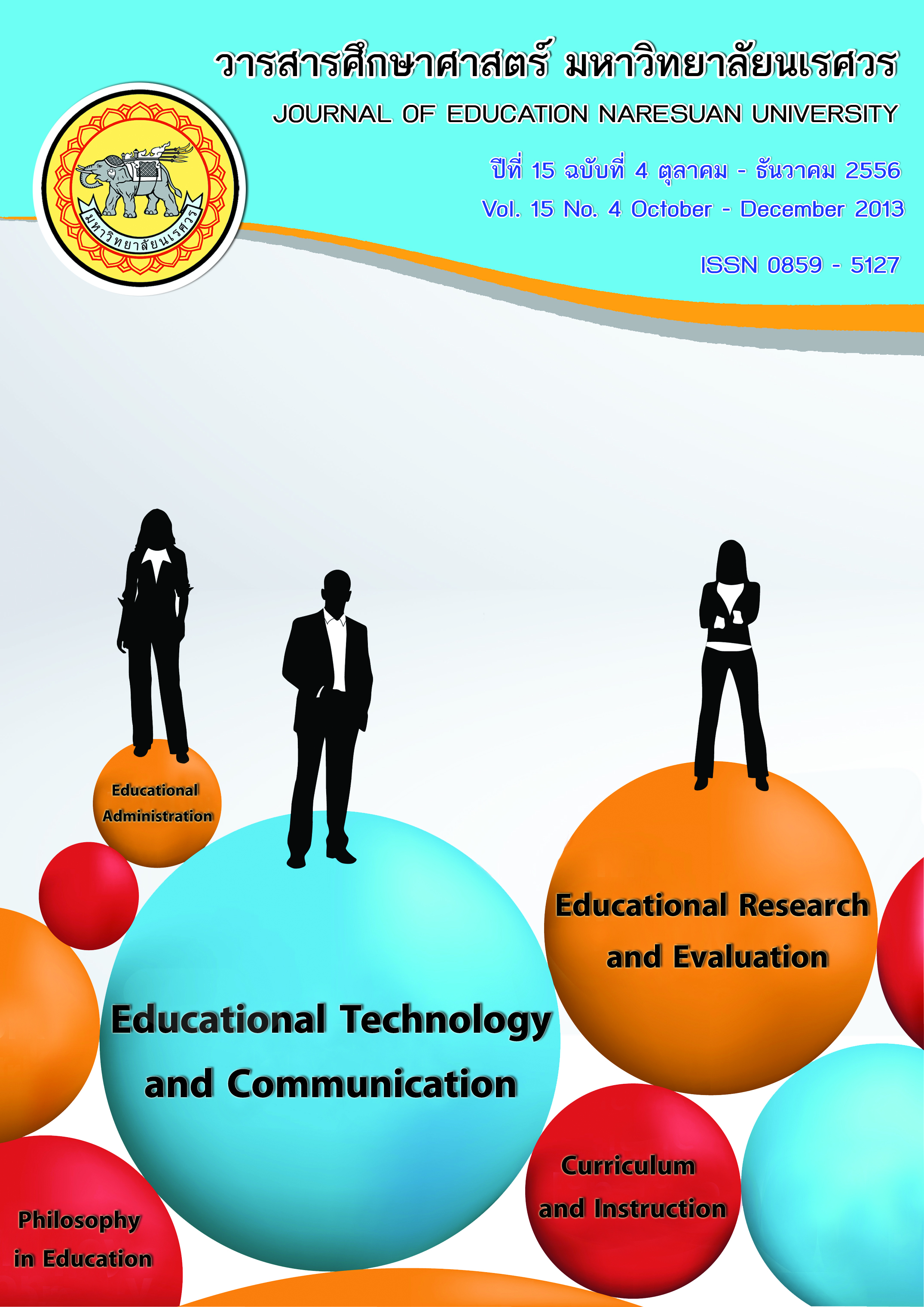การพัฒนาหลักสูตรฝึกอบรมครูสอนภาษาอังกฤษด้วยกระบวนการการจัดการความรู้ เพื่อพัฒนาสมรรถนะจัดทำหลักสูตรยุวมัคคุเทศก์ท้องถิ่น
Main Article Content
Abstract
บทคัดย่อ
การวิจัยครั้งนี้มีวัตถุประสงค์ 1. เพื่อศึกษาสมรรถนะที่จำเป็นของครูสอนภาษาอังกฤษในการจัดทำหลักสูตรยุวมัคคุเทศก์ท้องถิ่น 2. เพื่อสร้างและตรวจสอบคุณภาพหลักสูตรฝึกอบรมครูสอนภาษาอังกฤษด้วยกระบวนการการจัดการความรู้เพื่อพัฒนาสมรรถนะในการจัดทำหลักสูตรยุวมัคคุเทศก์ท้องถิ่น 3. เพื่อใช้หลักสูตรฝึกอบรมครูสอนภาษาอังกฤษด้วยกระบวนการการจัดการความรู้เพื่อพัฒนาสมรรถนะจัดทำหลักสูตรยุวมัคคุเทศก์ท้องถิ่นโดย 3.1) เปรียบเทียบความรู้ ความเข้าใจของครูก่อนและหลังการฝึกอบรม 3.2) ศึกษาทักษะในการจัดทำหลักสูตรยุวมัคคุเทศก์ท้องถิ่นของครูโดยเทียบกับเกณฑ์ร้อยละ 75 3.3) เปรียบเทียบเจตคติที่มีต่อการจัดทำหลักสูตรยุวมัคคุเทศก์ท้องถิ่นของครูก่อนและหลังการฝึกอบรม 4) เพื่อประเมินความคิดเห็นของครูที่มีต่อหลักสูตรฝึกอบรมครูสอนภาษาอังกฤษด้วยกระบวนการการจัดการความรู้เพื่อพัฒนาสมรรถนะจัดทำหลักสูตรยุวมัคคุเทศก์ท้องถิ่นดำเนินการตามกระบวนการวิจัยและพัฒนา 4 ขั้นตอน กลุ่มเป้าหมายเป็นครูสอนภาษาอังกฤษระดับประถมศึกษา สำนักงานเขตพื้นที่การประถมศึกษาสุโขทัย เขต 2 ที่เข้ารับการฝึกอบรม จำนวน 15 คน เครื่องมือที่ใช้ในการวิจัย คือ 1) ประเด็นสนทนา 2) แบบประเมินหลักสูตรและคู่มือการใช้หลักสูตรฝึกอบรม 3) หลักสูตรฝึกอบรมครูสอนภาษาอังกฤษด้วยกระบวนการการจัดการความรู้เพื่อพัฒนาสมรรถนะจัดทำหลักสูตรยุวมัคคุเทศก์ในแหล่งท่องเที่ยวท้องถิ่น 4) คู่มือการใช้หลักสูตรฝึกอบรม 5)แบบทดสอบวัดความรู้ ความเข้าใจในการจัดทำหลักสูตรยุวมัคคุเทศก์ท้องถิ่น 6) แบบประเมินทักษะปฏิบัติจัดทำหลักสูตรยุวมัคคุเทศก์ท้องถิ่น 7) แบบประเมินเจตคติ 8) แบบประเมินความคิดเห็นต่อหลักสูตรฝึกอบรมครูสอนภาษาอังกฤษด้วยกระบวนการการจัดการความรู้เพื่อพัฒนาสมรรถนะจัดทำหลักสูตรยุวมัคคุเทศก์ท้องถิ่น
ผลการวิจัยพบว่า
1. สมรรถนะที่จำเป็นของครูสอนภาษาอังกฤษในการจัดทำหลักสูตรยุวมัคคุเทศก์ท้องถิ่น 3 ด้าน คือ ความรู้ ทักษะ และเจตคติ สมรรถนะด้านความรู้ 5 ด้าน คือ 1) การจัดทำหลักสูตร 2) แหล่งท่องเที่ยวท้องถิ่น 3) ภาษาเพื่อการท่องเที่ยว 4) คุณลักษณ์ที่ดีของมัคคุเทศก์ 5) กระบวนการวิจัย สมรรถนะด้านทักษะ 5 ด้าน คือ 1) การจัดทำหลักสูตร 2) การจัดทำโครงสร้างหลักสูตร 3) การวัดประเมินผล 4) การนำหลักสูตรไปใช้ 5) การนำเสนอ สมรรถนะด้านเจตคติ 5 ด้าน คือ 1) ความสนใจใฝ่เรียนรู้ 2) ความภูมิใจในท้องถิ่น 3) ความต้องการให้นักเรียนรักท้องถิ่น 4) ความมุ่งมั่นและมีความรับผิดชอบ 5) ความต้องการจัดทำหลักสูตรยุวมัคคุเทศก์ท้องถิ่น
2. หลักสูตรฝึกอบรมมีองค์ประกอบดังนี้ 1) ปัญหาและความจำเป็น 2) วิสัยทัศน์ 3) หลักการ 4)เป้าหมาย 5) จุดประสงค์ 6) โครงสร้าง 7) เนื้อหา 8) กิจกรรมการฝึกอบรมใช้กระบวนการการจัดการความรู้สร้างวิสัยทัศน์/เป้าหมาย ร่วมแลกเปลี่ยนเรียนรู้ ประเมินและเผยแพร่ 9) สื่อและแหล่งเรียนรู้ในการฝึกอบรม และ 10) การประเมิน ผล และคุณภาพหลักสูตรฝึกอบรมครูสอนภาษาอังกฤษด้วยกระบวนการการจัดการความรู้เพื่อพัฒนาสมรรถนะจัดทำหลักสูตรยุวมัคคุเทศก์ท้องถิ่นโดยผู้ทรงคุณวุฒิพบว่า มีความเหมาะสมระดับมาก ผลการนำหลักสูตรไปทดลองนำร่องพบว่ามีความเหมาะสม
3. ผลการทดลองใช้หลักสูตรฝึกอบรมพบว่า 3.1) ครูมีความรู้หลังการฝึกอบรมสูงกว่าก่อนการฝึก อบรมอย่างมีนัยสำคัญทางสถิติที่ระดับ .01 3.2) ครูมีทักษะในการจัดทำหลักสูตรสูงกว่าร้อยละ 75 ซึ่งเป็นระดับดีทุกสมรรถนะ 3.3) ครูมีเจตคติต่อการจัดทำหลักสูตรหลังการอบรมสูงกว่าก่อนการอบรม อย่างมีนัยสำคัญทางสถิติที่ระดับ .01
4. ครูที่เข้ารับการฝึกอบรม มีความคิดเห็นต่อหลักสูตรฝึกอบรมที่พัฒนาขึ้นอยู่ในระดับดีมากทั้งภาพรวมและรายข้อทุกข้อ
คำสำคัญ: หลักสูตรฝึกอบรม/ การจัดการความรู้/ สมรรถนะในการพัฒนาหลักสูตร/ การพัฒนาหลักสูตร/ หลักสูตรท้องถิ่น
Abstract
The purposes of this study were 1. to study the essential competence of teachers in constructing local area youth-guide curriculum, 2. to construct and evaluate the quality of the training curriculum, 3. to use the training curriculum by 3.1) comparing the competence on content knowledge before and after training, 3.2) studying the competence on operating skills comparing to the criterion 75 percentage, and 3.3) comparing competence on attitude before and after the training, 4) to study the participants’ opinions towards the training curriculum. Four steps of the Research and Development process were used with 15 Prathomsuksa teachers of English from the Office of Basic Education Commission Sukhothai Area 2. The research tools are as follows: 1) Interviewing items, 2) Evaluation forms of the curriculum and curriculum handbook, 3) Training curriculum document, 4) Curriculum handbook, 5) Achievement test, 6) Operating skill evaluation form, 7) Attitude evaluation form, and 8) Opinion evaluation form.
The results were as follows:
1. The essential competence for teachers in constructing local youth-guide curriculum was categorized into three facets: content knowledge, operating skills and attitude. In terms of content knowledge, there were five supported competence as follows: 1) curriculum construction, 2) local tourist attractions, 3) English language for tourism, 4) good guide’s characteristics and, 5) research procedures. Next, five supported operating skills were: 1) curriculum construction, 2) curriculum content structure, 3) measurement and evaluation, 4) curriculum implementation, 5) presentation. Then five supported competence of attitude were: 1) learning desire and attention, 2) pride of locality, 3) student’s locality awareness, 4) determination and responsibility, 5) needs for curriculum construction.
2. Components of the training curriculum were 1) problems and necessities, 2) vision, 3) principles, 4) goals, 5) objectives, 6) learning units, 7) content structure, 8) training activities, use knowledge management process in the line KV,KS and KA, 9) media and learning resources, and 10) evaluation. The quality of training curriculum was appropriate at a high level, and the pilot study was suitable.
3. The results of using training curriculum revealed that: 3.1) The competence of teachers of English on knowledge acquisition after training was higher than before at the level of significance of .01. 3.2) The competence of teachers of English on curriculum construction skills was higher than 75 percentage (good). 3.3) The competence of teachers of English on attitude towards the curriculum after training was higher than before at the level of significance of .01.
4. The opinion of teachers who participated in training towards the training curriculum was at a very good level both in total and on every item.
Key words: Training Curriculum/ Knowledge Management/Competency of Curriculum Development/Curriculum Development/ Local curriculum
Article Details
The owner of the article does not copy or violate any of its copyright. If any copyright infringement occurs or prosecution, in any case, the Editorial Board is not involved in all the rights to the owner of the article to be performed.


